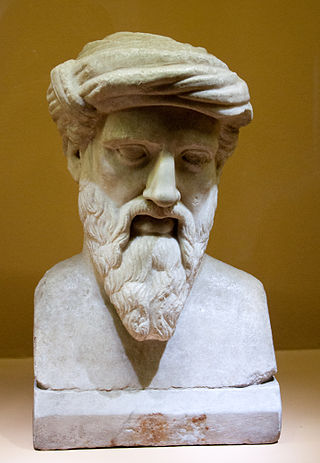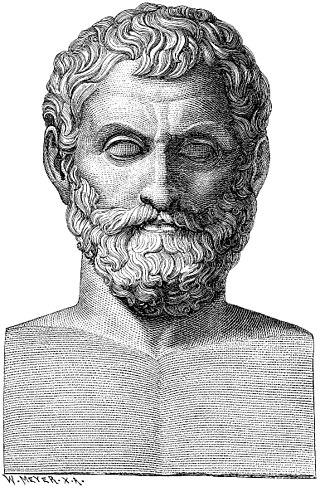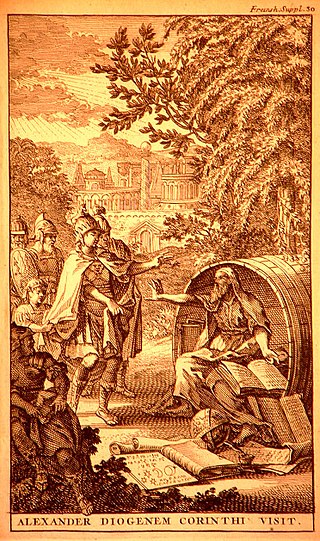
Epicurus was an ancient Greek philosopher and sage who founded Epicureanism, a highly influential school of philosophy. He was born on the Greek island of Samos to Athenian parents. Influenced by Democritus, Aristippus, Pyrrho, and possibly the Cynics, he turned against the Platonism of his day and established his own school, known as "the Garden", in Athens. Epicurus and his followers were known for eating simple meals and discussing a wide range of philosophical subjects. He openly allowed women and slaves to join the school as a matter of policy. Of the over 300 works said to have been written by Epicurus about various subjects, the vast majority have been destroyed. Only three letters written by him—the letters to Menoeceus, Pythocles, and Herodotus—and two collections of quotes—the Principal Doctrines and the Vatican Sayings—have survived intact, along with a few fragments of his other writings. As a result of his work's destruction, most knowledge about his philosophy is due to later authors, particularly the biographer Diogenes Laërtius, the Epicurean Roman poet Lucretius and the Epicurean philosopher Philodemus, as well as the hostile but largely accurate accounts by the Pyrrhonist philosopher Sextus Empiricus, and the Academic Skeptic and statesman Cicero.

Heraclitus was an ancient Greek pre-Socratic philosopher from the city of Ephesus, which was then part of the Persian Empire.

Plato, born Aristocles, was an ancient Greek philosopher of the Classical period who is considered a foundational thinker in Western philosophy and an innovator of the written dialogue and dialectic forms. He raised problems for what became all the major areas of both theoretical philosophy and practical philosophy, and was the founder of the Platonic Academy, a philosophical school in Athens where Plato taught the doctrines that would later become known as Platonism.

Pythagoras of Samos was an ancient Ionian Greek philosopher, polymath and the eponymous founder of Pythagoreanism. His political and religious teachings were well known in Magna Graecia and influenced the philosophies of Plato, Aristotle, and, through them, the West in general. Knowledge of his life is clouded by legend; modern scholars disagree regarding Pythagoras's education and influences, but they do agree that, around 530 BC, he travelled to Croton in southern Italy, where he founded a school in which initiates were sworn to secrecy and lived a communal, ascetic lifestyle. This lifestyle entailed a number of dietary prohibitions, traditionally said to have included aspects of vegetarianism.

Thales of Miletus was an Ancient Greek pre-Socratic philosopher from Miletus in Ionia, Asia Minor. Thales was one of the Seven Sages, founding figures of Ancient Greece, and credited with the saying "know thyself" which was inscribed on the Temple of Apollo at Delphi.
Diogenes was a Greek philosopher and one of the founders of Cynic philosophy.
Diogenes Laërtius was a biographer of the Greek philosophers. Little is definitively known about his life, but his surviving Lives and Opinions of Eminent Philosophers is a principal source for the history of ancient Greek philosophy. His reputation is controversial among scholars because he often repeats information from his sources without critically evaluating it. He also frequently focuses on trivial or insignificant details of his subjects' lives while ignoring important details of their philosophical teachings and he sometimes fails to distinguish between earlier and later teachings of specific philosophical schools. However, unlike many other ancient secondary sources, Diogenes Laërtius generally reports philosophical teachings without attempting to reinterpret or expand on them, which means his accounts are often closer to the primary sources. Due to the loss of so many of the primary sources on which Diogenes relied, his work has become the foremost surviving source on the history of Greek philosophy.

Xenophanes of Colophon was a Greek philosopher, theologian, poet, and critic of Homer from Ionia who travelled throughout the Greek-speaking world in early Classical Antiquity.

Diogenes, also known as Diogenes the Cynic or Diogenes of Sinope, was a Greek philosopher and one of the founders of Cynicism. He was born in Sinope, an Ionian colony on the Black Sea coast of Anatolia, in 412 or 404 BC and died at Corinth in 323 BC.

The Sherman Brothers were an American songwriting duo that specialized in musical films, made up of brothers Robert B. Sherman and Richard M. Sherman. Together they received various accolades including two Academy Awards and three Grammy Awards. They received nominations for a Laurence Olivier Award, a BAFTA Award, and five Golden Globe Awards. In 1976, they received a star on the Hollywood Walk of Fame, and the National Medal of the Arts in 2008.

The wise old man is an archetype as described by Carl Jung, as well as a classic literary figure, and may be seen as a stock character. The wise old man can be a profound philosopher distinguished for wisdom and sound judgment.

Epicharmus of Kos or Epicharmus Comicus or Epicharmus Comicus Syracusanus, thought to have lived between c. 550 and c. 460 BC, was a Greek dramatist and philosopher who is often credited with being one of the first comic writers, having originated the Doric or Sicilian comedic form.

Socratic dialogue is a genre of literary prose developed in Greece at the turn of the fourth century BC. The earliest ones are preserved in the works of Plato and Xenophon and all involve Socrates as the protagonist. These dialogues, and subsequent ones in the genre, present a discussion of moral and philosophical problems between two or more individuals illustrating the application of the Socratic method. The dialogues may be either dramatic or narrative. While Socrates is often the main participant, his presence in the dialogue is not essential to the genre.

Truly Scrumptious is a fictional character in the 1968 film Chitty Chitty Bang Bang and stage production based on the children's novel of the same name by author Ian Fleming.
In the field of psychology, absent-mindedness is a mental state wherein a person is forgetfully inattentive. It is the opposite mental state of mindfulness.

The meeting of Diogenes of Sinope and Alexander the Great is one of the most discussed anecdotes from philosophical history. Many versions of it exist. The most popular relate it as evidence of Diogenes' disregard for authority, wealth, and decorum.

Cynicism is a school of thought in ancient Greek philosophy, originating in the Classical period and extending into the Hellenistic and Roman Imperial periods. According to Cynicism, people are reasoning animals and the purpose of life and the way to gain happiness is to achieve virtue, in agreement with nature, following one's natural sense of reason by living simply and shamelessly free from social constraints. The Cynics rejected all conventional desires for wealth, power, glory, social recognition, conformity, and worldly possessions and even flouted such conventions openly and derisively in public.

Professor is an academic rank at universities and other post-secondary education and research institutions in most countries. Literally, professor derives from Latin as a "person who professes". Professors are usually experts in their field and teachers of the highest rank.

The Italian school of pre-Socratic philosophy refers to Ancient Greek philosophers in Italy or Magna Graecia in the 6th and 5th century BC. The doxographer Diogenes Laërtius divides pre-Socratic philosophy into the Ionian and Italian school. According to classicist Jonathan Barnes, "Although the Italian 'school' was founded by émigrés from Ionia, it quickly took on a character of its own." According to classicist W. K. C. Guthrie, it contrasted with the "materialistic and purely rational Milesians."
![Per Lindroth [sv], 1929, Den tankspridde professorn
(The Thoughtful Professor) Lindroth The Absent-minded Professor.jpg](http://upload.wikimedia.org/wikipedia/commons/thumb/f/fb/Lindroth_The_Absent-minded_Professor.jpg/220px-Lindroth_The_Absent-minded_Professor.jpg)
















